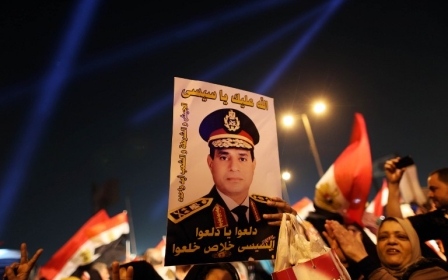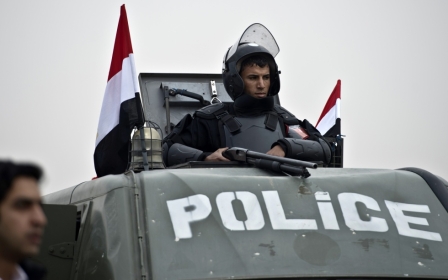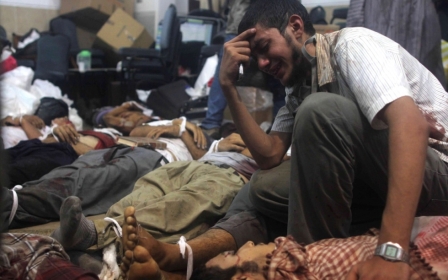Egypt’s human rights record condemned in UN

GENEVA - Several global powers, including the US and UK, strongly condemned Egypt’s human rights record during Wednesday's United Nations review in Geneva, although international observers remain cynical that real changes will ensue and fear that Egypt will not take on the recommendations.
"Steps taken by Egypt have resulted in violations of freedom of expression, peaceful assembly and association, deprived thousands of Egyptians of fair trial guarantees, and undermined civil society's role in the country," the US’s UN Human Rights Council representative, Keith Harper said.
Harper also called for the release of political prisoners and urged Egypt to "investigate excessive use of force by security forces, publicly release findings, and prosecute those identified as being responsible."
Egypt’s delegation to the UN Human Rights Council, carrying out the review, however defended its record. Minister of Transitional Justice, Ibrahim Heneidi who headed Egypt's representation at the meet told the Council that while the “country has witnessed major unconventional political and social circumstances” Egypt had come a long way since its first review in 2010.
Through its newly approved 2014 Constitution, Egypt has achieved "a true victory for human rights and freedoms" Heneidi said.
At the meeting, Egyptian officials put forward a bullish defence and brushed off criticism, insisting that Egypt has been abiding by the rule of law and international treaties despite a wave of attacks targeting its security services personnel. Hours after the review concluded two Egyptian policeman were killed and six civilians wounded when a bomb went off on a train. Recent weeks have also seen several large-scale attack in the Sinai, with 31 Egyptian security personnel killed on 24 October.
Delegations of Saudi Arabia, Russia, Cuba, China, the UAE and Venezuela backed Egypt’s assessment and recommended that Cairo “continue to fight terrorism,” with Saudi Arabia stressing its “unlimited support” for Egypt.
Other countries, however, slammed Egypt’s human rights record. Sweden, Austria, Ireland, Brazil and Turkey all voiced grave concerns over Egypt’s human rights abuses, singling out abuses like widely-reported crackdowns on peaceful protest for rebuke.
The Egyptian delegation was quick to respond to condemnations about police brutality against protesters and detainees by saying such claims were being made ahead of investigations currently underway.
Deputy Foreign Minister of Egypt, Hesham Badr, told the session that some of the comments by these UN delegations were based on "misconceptions," reminding attendees that “the government is acting within the boundaries of its laws in order to combat terrorism.”
A report on the session will now be submitted on 7 November by a troika review panel composed of Saudi Arabia, Montenegro and the Ivory Coast.
“After several countries strongly condemned Egypt, while others were softer and still others praised it, we now need for the Council to take action, not in the framework of the council's Universal Periodic Review(UPR) but in the framework of regular session,” said Nicolas Agostini from the Geneva-based International Federation of Human Rights Leagues (FIDH), after the session.
“The Human Rights Council's inaction has in a sense emboldened Egyptian authorities; nothing in terms of a resolution has been issued last year, it is now time for the HRC to send a strong message,” Agostini added.
Under its treaty obligations, Egypt is now expected to submit a second report - due in March - that will address the recommendations made during Wednesday’s session, which are to be finalised under the troika review this Friday.
The session comes on the back of strong criticism from NGOs and human rights groups which have criticised Egypt for failing to address a series of key issues in its recent human rights record, including allegations of mass killings, torture, arbitrary detention, excessive use of the death penalty and laws restricting NGOs.
Foremost amongst these criticisms is the so-called 14 August Rabaa massacre that happened near the Rabaa al-Adawiya mosque in Cairo when Egyptian army and police moved in to clear a Muslim Brotherhood protest camp. More than 1,000 people were reportedly killed in the incident, according to HRW.
Mass detentions have also been flagged up as a systemic issue in Egypt where human rights organisations and news agencies have indicated that between 16,000 and 41,000 people have been arrested or faced criminal charges since the removal of former President Mohamed Morsi last July.
Egypt has a long history of human rights abuses, many of which are seen to have been key grievances behind the popular protests that succeeded in removing President Hosni Mubarak in January 2011 after more than 30 years in power.
While periodic human rights abuses continued, Egypt enjoyed a relative period of improvement following Mubarak’s fall and leading into Morsi’s election in June 2012. Morsi has himself been criticised for trying to crack down on rights and freedoms but Human Rights Watch has documented what it describes as a serious uptick in violations since his oust last July.
Since his overthrow, Egypt has undergone the “most dramatic reversal of human rights” in the country’s history, HRW said on Tuesday.
According to International Criminal Court (ICC) specialist, Rodney Dixon QC, who attended the session, Egypt has continued to use the threat of terrorism to justify excessive use of force.
International lawyers agree that "there needs to be a commission of inquiry to show evidence" of the crimes in the wake of the well-documented accusations levied by several human rights groups, Dixon explained.
Human Rights Watch’s acting director, Phillipe Dam also called for a wider review.
“This session [only] creates awareness that this process is not enough…if the future of Egypt will be based on the rule of law, the international community must remain vigilant and put further pressure on Egypt until March,” he said after the session.
At least seven Egyptian NGOs pulled out from participating in the session out of fear of reprisal, they declared in a joint statement this week.
The UN review came just days before a 10 November deadline for unregistered NGOs to conform to new regulations deemed “draconian” by opposition groups.
“This fear is especially pertinent in the context of the hostile climate in which they work,” the NGOs said in a statement.
However, Egypt’s deputy foreign minister for human rights, Hisham Badr declared that there is no final draft for a new NGOs law, and that it will be postponed until a new parliament is elected later this year, although the Egpyptian delegation made no indication at Wednesday's session when restrictions on NGOs would be lifted.
Toby Cadman, international law specialist said: “Egypt only managed to reply by criticising states that condemned its record or by saying that investigations were still underway and that claims were untrue.”
“More decisive action is required in March, which will be an opportunity to see if Egypt has followed through with its commitments and see what countries - such as the US and UK - have done,” he added.
New MEE newsletter: Jerusalem Dispatch
Sign up to get the latest insights and analysis on Israel-Palestine, alongside Turkey Unpacked and other MEE newsletters
Middle East Eye delivers independent and unrivalled coverage and analysis of the Middle East, North Africa and beyond. To learn more about republishing this content and the associated fees, please fill out this form. More about MEE can be found here.




